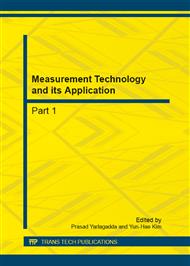p.1165
p.1169
p.1173
p.1179
p.1184
p.1188
p.1194
p.1202
p.1206
Radar Target Tracking Error Research Using Kalman Filter-Based Algorithms
Abstract:
The methods of radar target tracking have a substantial effect on the accuracy of the whole radar systems. The basic principles and implementing steps of the Extended Kalman filter (the EKF) and the Unscented Kalman filter (the UKF) are briefly introduced. The main sources of radar observation errors and the limitation of the current methods are analyzed. According to the requirements of tracking a CV target, the EKF and the UKF are used to simulate the experiments by establishing the specific model of radar target tracking. The results show that the tracking errors can be constrained within a certain range and the whole systems also have the high tracking accuracy.
Info:
Periodical:
Pages:
1184-1187
Citation:
Online since:
December 2012
Authors:
Price:
Сopyright:
© 2013 Trans Tech Publications Ltd. All Rights Reserved
Share:
Citation:


